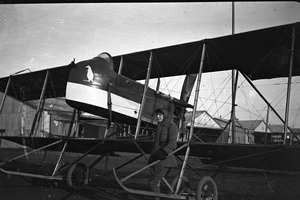[Received December 20, 1917]
Royal Flying Corps,
Ruislip,
Middlesex.
[(Saturday) November 24, 1917]
Dear Mother:
Your letter of Oct. 7 received and enjoyed, also the clippings. That picture of Spalding is a very good likeness. Glad to hear of the enthusiasm at the Lyric. I did not make any remark about what you said about Margaret and her desire to let Russell do whatever he is called upon to do, but I thought it very fine. I am slowly getting all of your letters. I got the one Father wrote on Oct. 7, after receiving my cable. It had been to Washington, Mineola, Italy, Paris, London and here. I will be tickled to get that box. I want that underwear every time I have to put my one latest model in the wash. Sorry I did not hear about Cousin Anna Grafflin soon enough to see her. How is the food conservation coming along. Here in England you have to be in the army to get enough to eat. I have a whole bunch of things to write about tonight, viz. my all day trip to London today and my chat last night with a 1st lieutenant who got shot down by a Hun. But the staff officers instructors are having a sociable next door and I have just been asked to join. It is 9:30 so I will have a party and go to bed. Finish this tomorrow.
Lovingly,
Parr.

Parr did not date this letter, but it must have been written on November 24, 1917, the day of his “all day trip to London,” which his next letter indicates took place on Saturday.
Presumably the Lyric Theater, as it was then called, in Baltimore.
Parr’s sister Margaret had married James Russell McQueen in 1915; he did not, as far as I am aware, serve in the military but continued to work in the engineering department of the Washington Gas Light Company.
Amne (Parr was not alone in writing “Anna” instead of “Amne”) Grafflin was actually a cousin of Parr’s father (Herbert Hooper’s aunt, Laura Hooper, married George W. Grafflin; Amne was the middle of their three children), and an interesting woman in her own right.148 Shortly after her wealthy father died in November 1896, she married Walter Watkins Vrooman, a socialist thinker, writer, orator, and activist (and apparently also a fortune hunter).149 In 1899 the Vroomans, together with Charles A. Beard, founded Ruskin College in Oxford, an educational institution for working class men unable to attend university; Amne’s wealth financed the effort.150 With Amne often serving as editor, they published the journal Young Oxford; Amne herself wrote on women, domestic issues, and class.151 Returning to the U.S., Walter Vrooman sought to expand the “Ruskin Hall Movement,” intending to open colleges in several states.152 In his home state of Missouri he transformed the foundering Avalon College in Trenton into Ruskin Hall and tried to turn the town into a Utopian cooperative.153 By 1903 the business plan had collapsed, and Amne sued Vrooman for divorce, claiming he had squandered a quarter of a million dollars of her money.154 The divorce granted, she reverted to her unmarried name.155 She lived for a time in Baltimore, but returned to Oxford in 1912, at which time she laid a foundation stone for a new building for Ruskin College, which she continued to support.156 She came back to England again in 1914 and remained there through the war.157